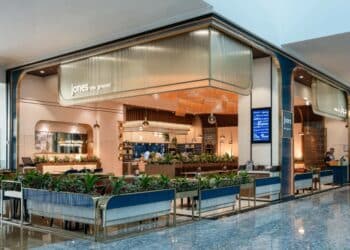 The hospitality industry rebounded strongly in 2023, with the Middle East leading the charge. Such resurgence is fuelled by rising demand and a fundamental shift in guest expectations – today’s travellers crave seamless, tech-driven experiences that elevate their stay.
The hospitality industry rebounded strongly in 2023, with the Middle East leading the charge. Such resurgence is fuelled by rising demand and a fundamental shift in guest expectations – today’s travellers crave seamless, tech-driven experiences that elevate their stay.


In this article, we will discuss five key technological trends shaping the future of hospitality. From F&B and travel industry experts, Alexander Ponomarev, CEO of Syrve MENA, and Stan Klyuy, CCO of Tumodo, we’ll explore how technology is making the sector more sustainable, efficient, and, most importantly, guest-centric.
#1 Sustainability and Food-Waste-Oriented Technology
The United Arab Emirates faces a challenge: 38% of prepared food goes to waste annually, costing 6 billion AED. Recognising the urgency, the National Food Loss and Waste Initiative has set an ambitious goal: to reduce food waste by 50% by 2030. This goal aligns perfectly with the UAE’s Green Agenda 2030, which prioritises sustainable practices. This challenge has sparked a wave of innovation among local hospitality businesses tackling food waste head-on. Leading industry experts in food tech have developed technology that predicts customer behaviour, sales figures, and order types with 99% accuracy. In turn, restaurants can leverage these insights to optimise inventory management and kitchen prep, reducing the risk of overstocking and food spoilage. This trend of AI-powered sales forecasting and scheduling follows. The sustainability movement extends beyond the plate. For example, some business travel platforms take a holistic approach by analysing carbon footprints associated with business travel. In a nutshell, they help companies create personalised net-zero strategies while encouraging employees to embrace eco-friendly practices, contributing to a broader culture of sustainability.
#2 Robotics
Robots are revolutionising the hospitality industry, boosting efficiency, minimising waste, and elevating guest experiences. This technology empowers hotels to streamline operations, enhance customer satisfaction, and reduce costs. For instance, robots can handle repetitive housekeeping tasks, freeing staff for more personalised guest interactions. Imagine a robot efficiently delivering fresh towels or whisking away laundry, all at the guest’s request – this is already today’s reality.
The benefits of robotics extend beyond the hotel room. In particular, the F&B industry has witnessed a surge in robotics. Over the past decade, consumer goods robots have doubled, and experts predict a near-50% increase by 2029. In fact, they can seamlessly transition between roles, acting as waiters, bartenders, or chefs, assembling pizzas, crafting custom cocktails, or learning new recipes online, constantly expanding their culinary repertoire. As a vivid example, AI-powered bartenders like BarGPT can generate personalised cocktail recipes based on user preferences, flavours, or spirits.
#3 Data-Driven Reports In today’s fast-paced digital world, data propels businesses forward. While some hospitality companies rely on reports, innovative players leverage real-time data to empower their teams and gain a competitive edge. By making this information readily accessible, everyone within the organisation can make informed decisions that drive business growth.
The benefits of data-driven insights are not limited to profits, as some MENA startups are tackling sustainability challenges with real-time data analytics. For instance, there are cases of AI-powered platforms that calculate carbon footprints and recommend the most efficient, eco-friendly routes for business travel, allowing companies to “work smarter, not harder” while minimising their environmental impact.
#4 Artificial Intelligence
The hospitality industry is embracing a wave of innovation fuelled by AI. A recent Lenovo study revealed a higher adoption rate in the MENA region (64%) compared to EMEA (57%). Thus, the adoption of AI is driving several key trends that are transforming the industry.
On the operational side, AI optimises demand forecasting, dynamic pricing, delivery routes, and staff scheduling. It’s also assisting with predictive maintenance for equipment, reducing downtime and costs. Moreover, AI is personalising the guest experience. From tailored recommendations to in-room adjustments based on preferences, AI creates a more comfortable and fulfilling stay for each visitor.
The impact of AI extends even further. Hoteliers leverage AI for investment analysis, evaluating potential property renovations or acquisitions, allowing for more strategic resource allocation based on data-driven insights. Furthermore, integrating AI with guest reviews and Net Promoter Scores provides deeper insights into customer satisfaction and performance.
#5 On-demand Entertainment Access
The hospitality industry is experiencing a paradigm shift driven by the increasing importance of on-demand entertainment for guest satisfaction. Traditionally limited to a fixed selection of TV channels and pay-per-view offerings, hotels strategically leverage technology to cater to evolving guest preferences.
High-speed internet access and in-room smart TVs have become the industry standard. This allows guests to seamlessly access their preferred streaming services, such as Netflix and Amazon Prime Video, directly on their hotel room televisions. Such familiarity and convenience enhance the guest experience by providing a comfortable way to unwind after travel or business activities. Implementing these fast-forward technologies has challenges, such as initial investment costs and staff training needs; however, the benefits are undeniable. The hospitality industry can create a more sustainable, efficient, and guest-centric future by embracing technological advancements.


































































